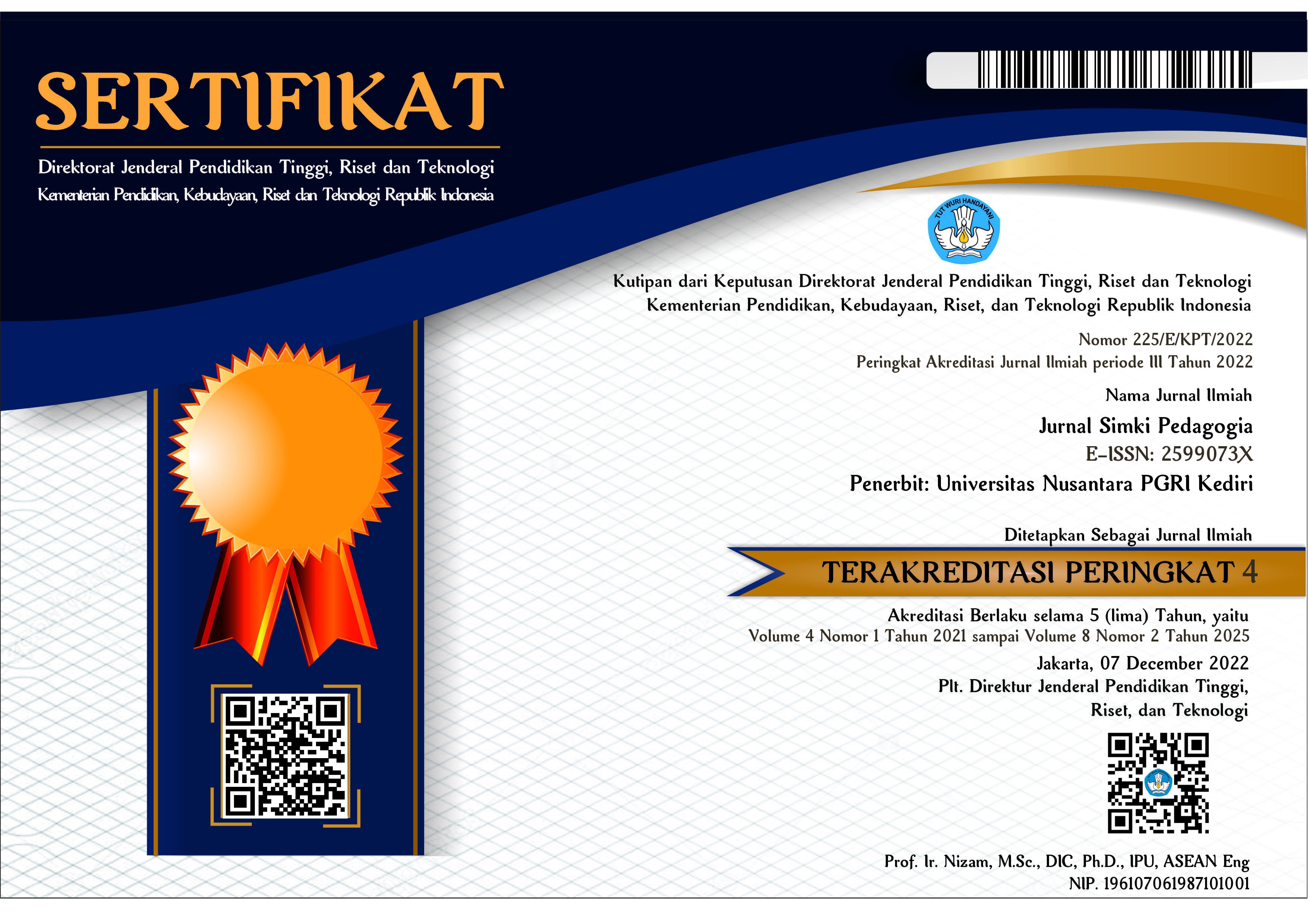Gamifying Reading Motivation in EFL Students: Enhancing Engagement and Language Learning Through ICT
 Abstract views: 1420
,
Abstract views: 1420
,
 PDF downloads: 533
PDF downloads: 533
Abstract
This research investigates the potential of gamification in encouraging reading motivation among English as a Foreign Language (EFL) students. Reading motivation is crucial in language learning, and gamification offers promising inenues to enhance it. The study examines both reading skills and the various factors influencing reading motivation. Utilizing a conceptual paper methodology, this research systematically analyzes existing literature, theories, and concepts related to gamification and reading motivation in EFL learning, providing a comprehensive synthesis that forms the basis for understanding the potential impact of gamification on enhancing reading motivation among students. The synthesis of findings indicates that gamification positively impacts EFL learners’ reading motivation by fostering greater involvement, independence, and belief in their reading abilities. By incorporating game elements like points, badges, and leaderboards, this study reveals that through gamification in reading activities, learners not only achieve a sense of progress and competition but also overcome challenges like lack of interest, self-confidence, and autonomy in EFL reading, ultimately fostering increased motivation.
Downloads
References
Alsawaier, R.S. (2018), "The effect of gamification on motivation and engagement", International Journal of Information and Learning Technology, Vol. 35 No. 1, pp. 56-79. https://doi.org/10.1108/IJILT-02-2017-0009
Barbosa, P. (2008). Role of reading engagement in mediating effects of reading comprehension instruction on reading outcomes. Psychology in the Schools, 45(5), 432–445. https://doi.org/10.1002/pits.20307
Chen, S. Y., & Wu, C. Y. (2020). The effectiveness of gamification on improving English learning motivation: A literature review. International Journal of Emerging Technologies in Learning, 15(5), 222-234. https://doi.org/10.3991/ijet.v15i05.11872
Domínguez, A., Saenz-de-Navarrete, J., de-Marcos, L., Fernández-Sanz, L., Pagés, C., & Martínez-Herráiz, J. J. (2013). Gamifying learning experiences: Practical implications and outcomes. Computers & Education, 63, 380-392. https://doi.org/10.1016/j.compedu.2012.12.020
Errol Scott Rivera & Claire Louise Palmer Garden (2021) Gamification for student engagement: a framework, Journal of Further and Higher Education, 45:7, 999-1012, https://doi.org/10.1080/0309877X.2021.1875201
Freitas, L. E. de, & Ferreira, L. A. (2020). A didactic sequence from a gamification application for reading the status of children and adolescents: an active methodology. Research, Society and Development, 9(9), e414997412. https://doi.org/10.33448/rsd-v9i9.7412
Guthrie, J. T., Wigfield, A., & You, W. (2012). Instructional contexts for engagement and achievement in reading. In S. L. Christenson, A. L. Reschly, & C. Wylie (Eds.), Handbook of research on student engagement (pp. 601-634). Springer US. https://psycnet.apa.org/doi/10.1007/978-1-4614-2018-7_29
Hojjat Dehghanzadeh, Hashem Fardanesh, Javad Hatami, Ebrahim Talaee & Omid Noroozi (2019): Using gamification to support learning English as a second language: a systematic review, Computer Assisted Language Learning, https://doi/org/10.1080/09588221.2019.1648298
Koivisto, J., & Hamari, J. (2019). The rise of motivational information systems: A review of gamification research. International Journal of Information Management, 45, 191-210. https://doi.org/10.1016/j.ijinfomgt.2018.12.005
Landers, R. N., & Landers, A. K. (2014). An empirical test of the theory of gamified learning: The effect of leaderboards on time-on-task and academic performance. Simulation & Gaming, 45(6), 769-785. https://doi.org/10.1177/1046878114559090
Li, X. and Chu, S.K.W. (2021), Exploring the effects of gamification pedagogy on children’s reading: A mixed-method study on academic performance, reading-related mentality and behaviors, and sustainability. Br. J. Educ. Technol., 52: 160-178. https://doi.org/10.1111/bjet.13057
Liao, Y. H., Chen, Y. T., & Chan, C. P. (2019). Investigating the relationship between reading motivation and English reading proficiency: Evidence from Taiwanese college students. Journal of Educational Research, 112(3), 336-347. http://dx.doi.org/10.1177/1028315314533607
Liu, Y. T., Chen, H. C., & Chang, H. Y. (2019). Enhancing EFL students' reading motivation and comprehension through gamification elements. Journal of Educational Technology Society, 22(4), 244-256.
Loh, C. S., & Sheng, Y. (2019). Engaging students in reading: An empirical study on the effect of gamification elements on motivation and engagement. Computers & Education, 132, 15-29.
Rostami, Z., & Gholami, R. (2020). The effect of motivation on Iranian EFL learners' reading comprehension. Journal of Language Teaching and Research, 11(6), 791-796.
Ryan, R. M., & Deci, E. L. (2017). Self-determination theory: Basic psychological needs in motivation, development, and wellness. Guilford Press. behaviors with educational technology. Computers & Education, 54(1), 103-112. http://dx.doi.org/10.7202/1041847ar
Tan, Y.L.L. (2018). Meaningful gamification and students’ motivation: A strategy for scaffolding reading material. Online Learning, 22(2), 141-155. http://doi.org/10.24059/olj.v22i2.1167
Vathanalaoha, K. (2022) Effects of gamification in English language learning: The implementation of Winner English in secondary education in Thailand. LEARN Journal: Language Education and Acquisition Research Network, 15(2), 830-857. https://so04.tci-thaijo.org/index.php/LEARN/article/view/259953
Wang, J. H., Hwang, G. J., Tsai, C. C., & Tsai, M. J. (2019). What types of reading motivation are relevant to elementary school students' reading achievement? A latent profile analysis. British Journal of Educational Technology, 50(6), 2926-2943. http://dx.doi.org/10.1006/ceps.1999.1044
Wu, T. T., Hwang, G. J., & Chen, S. H. (2019). Effects of a gamified peer assessment system on students' motivation, attitudes, and learning performance in a mathematics course. Journal of Educational Technology & Society, 22(4), 223-235. http://dx.doi.org/10.14686/buefad.424575
Copyright (c) 2024 Fitri Pangestu Noer Anggrainy, Sharizan, Ricky Sriyanda, Muhammad Farhan

This work is licensed under a Creative Commons Attribution 4.0 International License.

Jurnal Simki Pedagogia : https://jiped.org/index.php/JSP/index is licensed under a Creative Commons Attribution 4.0 International License.
















